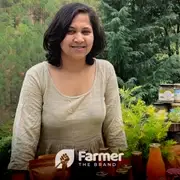
Women and Nature are omnipresent they are apart and parcel of life yet they remain invisible and all of us take both for granted. There are ample stories of neglect and hardship. Garhwal region also has its fair share of stories of alcoholism and abuse and whatnot. “All my life I only did household work and remained busy in the family. Since the time I started working at Himalayan Haat, I felt more confident and independent. My husband doesn’t have a permanent job and I am so glad that I can support my family”, says Pushpa. Likewise, there is a long list of empowered Women like Pushpa, Sundari, Shashi, Pooja, Deepa, Babita, Rupa, Vimla, Sonam, and Parvati. They are the backbone of the social enterprise Himalayan Haat. Himalayan Haat trains and enables local village women to get financially independent.

These ladies are involved in the harvesting, cutting, chopping, canning, and packaging of our products. Our aim is to help them become financially independent while enabling them to create gourmet, beautifully packaged products that they can be incredibly proud of. Indira, a retired school teacher with years of old-fashioned cooking behind her, dons the chef’s hat.

Himalayan Haat is a social enterprise that was started in 2014 by the mother-daughter duo (Indira and Divya Chowfin) in our farm kitchen in Pauri, Uttarakhand. My father, says Divya, Ronnie Chowfin, had dedicated his life to farming and forest conservation since the late 1960s. And, as a result of his life work, we have the incredible privilege of looking after a beautiful farm, orchard, and forest with rich supplies of spring water that cater to 14 villages in the district. Divya’s father had been farming here for decades and after is demise both mother and daughter realized that there was no real market for the fantastic produce farmers grew there anymore. It was either sold for a pittance or consumed by the family or just distributed. Indira had always been making preserves, sauces, and concentrates for decades using fresh produce from their farm. They now make slightly larger batches to make artisanal homemade products and their product ranges from seasonal preserves to sauces to juice concentrates to pickles, herbal infusions, and herbed salts.


The Editor, AW, Lakshmi Unnithan was in conversation with Divya and she reiterates that Himalayan Haat is much more than a food-processing business. Reviving natural farming practices among the local community to bring socio-economic change in the area, encouraging locals to plant trees and grow crops and also educating the local villagers about the sustainable use of the forests and other resources are all underlying visions of Himalayan Haat.


They follow a “jungle farming” concept on their farm, which is as close to natural farming as can be. We use leaf mold from the forest and cow dung as fertilizers and our fruit trees are planted in between oaks and wild trees, says Divya. At no stage are any chemical sprays, urea, pesticides or fertilizers used on our crops or trees. We share our produce with birds and wild animals (bears love our pears and walnuts while barking deer go after our chillis and tomatoes!) and feel it is a blessing to be able to share our living space with these creatures.

Before signing off she says that they also grow strawberries, citrus fruit, walnuts, pears, peaches, plums, apricots, herbs like rosemary, chamomile, lemongrass, bay leaf, and various seasonal vegetables like tomatoes, chillis, and garlic on the farm.


















Share your comments